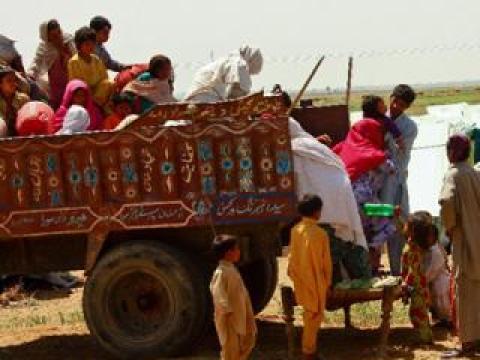Relief for 350,000 displaced but needs still great in Pakistan’s troubled north-west

The conflict between government forces and the Taliban militants that triggered the displacement of more than 2.5 million people from Swat, Dir and Buner districts in May and June 2009 may be over, but daily life remains a challenge for the returning population.
Assistance is now shifting from emergency relief to livelihood and economic recovery as displaced communities return to their homes World Vision Pakistan responded by providing emergency relief support in Buner and Lower Dir Districts through water and sanitation interventions, providing household items, food aid, Child Friendly Spaces, shelter kits, livelihood support, primary health care services and cash vouchers to IDPs and host families.
Food rations are currently being distributed to 60,000 households every month in Buner district in partnership with the World Food Programme and water purification packets are distributed to ensure the displaced have clean drinking water. Fifty-two communal water sources have been rehabilitated in various villages benefitting 36,000 people.
Meanwhile, in partnership with the CWS, World Vision has distributed 900 hygiene kits, 900 family kits and 2,700 blankets to some 6,570 IDPs in Dera Ismail Khan district who have fled separate conflicts in South Waziristan. Military restrictions on movement and humanitarian activities by international organisations in the area continue to pose challenges.
Any significant increase in the number of displaced persons could lead to a further deterioration of the current conditions Assistance is now shifting from emergency relief to livelihood and economic recovery as displaced communities return to their homes. World Vision is currently working to assist some 86,400 people through Cash for Work activities and other agricultural activities, operating out of offices in Buner and Lower Dir.
Over the coming months most of the IDPs will continue to need humanitarian assistance, specifically shelter, food, water and sanitation and the delivery of basic social services including health and education.
As the frontlines shift towards other troubled parts of Pakistan on the Afghan border, tens of thousands of people are likely to be displaced joining those already taking refuge in poor communities. Any significant increase in the number of displaced persons could lead to a further deterioration of the current conditions.
-Ends-
Other relief interventions to date:
- Shelter kits provided to 2312 households (23120) individuals
- Water & Sanitation non-food item kits and purification kits provided to 6,500 families (65000 Individuals). Emergency support in health services provided to 600 families
- 1,800 cash vouchers distributed to 1,800 families
- Cash for work/early recovery activities target 130,000 people in Buner
- 3 child friendly spaces have been established for 800 children in Buner
- Child protection committees have been formed and trained in 5 communities
- 1,800 women have received nutrition training and livelihood support.
Future activities:
- Assistance to displaced families returning to places of origin in Lower Dir and Buner districts
- Continued assistance to children in crisis (street children, working children, etc)
- Support to children and communities for better health, hygiene
- Empower women through literacy programmes, vocational training and improved agricultural techniques
- Create sustainable livelihoods with respect for the environment – through organic farming and tree plantation
- Awareness raising regarding HIV and AIDS, and support for people and families affected
- Continued advocacy work in areas related to child well-being